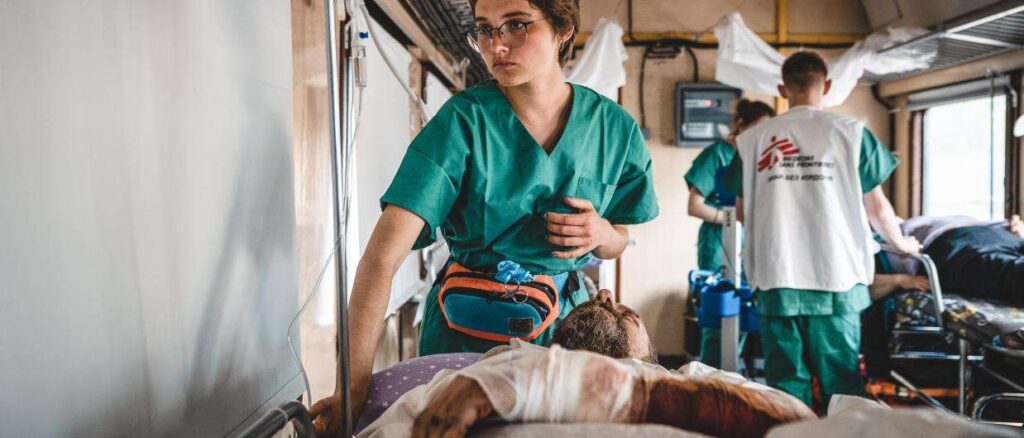
Accounts from MSF’s patients reveal how children and elderly people are affected by heavy weaponry and indiscriminate attacks.
The war in Ukraine is indiscriminately harming civilians who are struck by heavy weaponry in their homes, shelters, and evacuation routes, according to a report released today by Doctors Without Borders/Médecins Sans Frontières (MSF), which is based on the experiences of patients that the organization has evacuated from eastern Ukraine by train.
Since March 31, MSF has medically evacuated more than 650 patients from war-affected areas in the east to hospitals in safer parts of the country. Medical data and accounts from these patients and their caretakers show that the war in Ukraine is being conducted with an outrageous disregard for civilian lives. This points to a lack of respect for civilian protection, which is a serious violation of international humanitarian law, MSF said.
“Children and elderly people make up a large proportion of the patients with war-related injuries that we care for on our medical trains,” said Avril Benoît, executive director of MSF in the United States. “Many have wounds associated with blasts that suggest the use of explosive weapons with a wide impact area, such as missiles, or artillery. When weapons like these are used in residential areas, it’s highly likely that civilians will be killed and injured.”
People referred on MSF’s medical trains are typically long-term hospitalized patients or recently war-wounded people who need postoperative care. Over 40 percent of the 355 war-wounded patients have been elderly people and children with blast wounds, traumatic amputations or injuries from shrapnel or gunshots.
Many people shared their harrowing experiences with MSF’s doctors and nurses, who monitored the patients and kept their conditions stable on the 20- to 30-hour journey west.
“Our patients’ wounds and the stories they tell show unquestionably the shocking level of suffering the indiscriminate violence of this war is inflicting on civilians,” said Christopher Stokes, MSF emergency coordinator. “Many patients on the MSF train were wounded by military strikes that hit civilian residential areas. Although we cannot specifically point to an intention to target civilians, the decision to use heavy weaponry en masse on densely populated areas means that civilians are inescapably, and are therefore knowingly, being killed and wounded.”
From the accounts of patients, several consistent and harrowing themes emerged:
—Civilians have been shot at while evacuating or attacked while trying to leave war zones.
—Indiscriminate bombing and shelling have killed and maimed people living and sheltering in residential areas.
—Elderly people have been brutalized and directly attacked, and their particularly vulnerable status has been completely overlooked by attacking forces.
—The types of wounds are often extensive and horrific, indiscriminately affecting people whether male or female, young or old.
As in all conflicts, MSF calls on all armed groups to respect international humanitarian law and abide by their obligations to protect civilians and civilian infrastructure, allow people to flee to safety, and allow for the safe and timely evacuation of the sick and wounded. In addition, MSF calls for humanitarian access to be able to provide assistance to people no matter where they are. This call is particularly urgent as indiscriminate attacks on civilians in Ukraine continue.
MSF first worked in Ukraine in 1999. Since February 24, 2022, we have significantly scaled up and reoriented our activities to respond to the needs created by the war in Ukraine. This includes a medical referral train that receives patients from hospitals near to the front lines in the east that are receiving or preparing to receive influxes of newly wounded patients, and transfers them to hospitals in the west of the country, where they can continue their treatment. The medical train is run in collaboration with Ukraine’s Ministry of Health and National Railways. Between March 31 and June 6, MSF transported and cared for 653 patients on the train. In the east and south, MSF also runs an ambulance referral system. While MSF provides medical assistance in the regions affected by heavy fighting in the east and south of Ukraine and on the referral train, we do not have direct access to the places most of our patients come from and where fighting is most brutal. MSF is also providing medical and humanitarian assistance to people displaced into other areas of Ukraine, including providing mental health care, treating survivors of sexual violence, running mobile clinics and donating medical and other supplies to hospitals. Surgical teams are also assisting in hospitals in the east and south, where MSF also provides ambulance referral between hospitals. Our teams also provide humanitarian assistance to people from Ukraine in neighboring Belarus, Poland, Russia and Slovakia.
